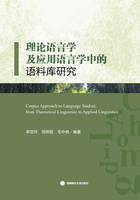
3. The corpus
The corpus compiled for this study is a collection of Chinese undergraduate and postgraduate dissertations from 5 different universities in China. The academic texts are on two subjects, Business and Management and English Literature. The undergraduate and postgraduate distinction was designed to be considered as academic texts of different stages of inter-language proficiency, namely, advanced-UG and advanced-PG. The UG/PG distinction corresponds to the stages similar to that of the Chinese higher education system:four years of undergraduate training for a Bachelor's Degree and another three years of postgraduate(taught)for a Master's Degree after the students have successfully passed their oral examinations and submitted their dissertations. To collect the dissertations of the two subjects were to explore disciplinary differences in Chinese students' academic discourse. The corpus consists of 456 texts,4,193,413 tokens and 107,805 types. A further sweeping and extraction returned 6,813 instances, including 1,730 hits of I and 5,038 hits of we that are used to present the student writer themselves. The findings of the divergence of the use of I and we between different stages and the two disciplines were reported in Zou (2018). In general, it is found that there is a greater difference between the two academic stages than the divergence between the two disciplines in terms of the uses of the two FPPs. In this paper, however, as mentioned, I take a rather subjective interpretation of the choices of using/not using the FPPs, I and we in the assembled students'texts from a teacher-research point of view. In the next two sections, I discuss the choices between FPPs and other possible impersonal expressions(Section 4)and choices between the two FPPs, I and We(Section 5).